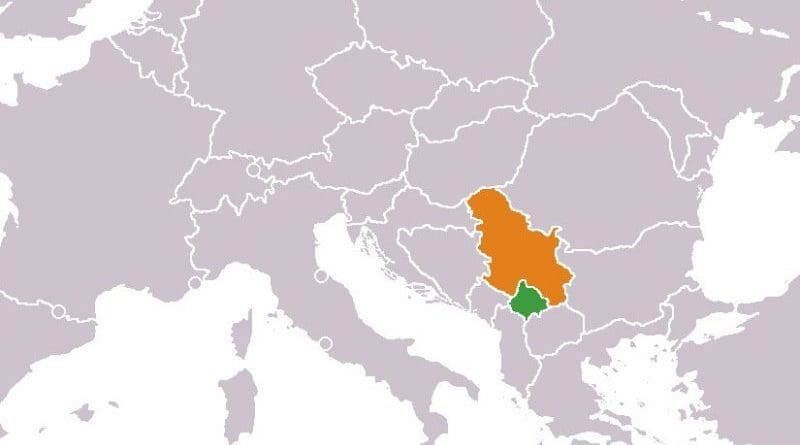Serbia Mourns 1999 Bombing Victims; Kosovo Thanks NATO
By Filip Rudic and Die Morina
Serbia marked the 18th anniversary of NATO bombing of Yugoslavia with a ceremony in Grdelica, where a passenger train was hit – but Kosovo officials gave thanks for the Western military intervention.
Several hundred people joined Serbian Prime Minister Aleksandar Vucic in Grdelica on Friday to commemorate the victims of the NATO bombing of Yugoslavia, which started on March 24, 1999.
Vucic said at the ceremony that NATO’s military intervention, which was intended to halt Yugoslav President Slobodan Milosevic’s offensive in Kosovo, was “one of the most brutal aggressions in the history of warfare”.
“Serbia is now stronger than it was in the past years and decades. It will never again suffer aggression from which it will not emerge victorious,” Vucic added.
He said that Serbia has now chosen to have “respectful” relations with NATO, but will never seek membership of the allience.
The passenger train was hit by two NATO aircraft while it was crossing the bridge on April 12, 1999. Nine bodies have been found, but the total number of casualties remains unknown.
The beginning of the commemoration was marked by an air-raid siren, after which a train stopped at the bridge and a moment of silence was observed.
Vucic and Bosnian Serb leader Milorad Dodik laid wreaths at the site, accompanied by the victims’ families.
Dodik said that Republika Srpska, the Serb-dominated part of Bosnia and Herzegovina, will follow Serbia’s lead and refuse to become part of NATO.
“Republika Srpska knows it is part of Bosnia and Herzegovina, but this is out of compulsion, not out of choice,” Dodik said.
Commemorations of NATO bombing were also held in Belgrade and other cities in Serbia.
President Tomislav Nikolic unveiled a bronze memorial dedicated to ‘Serbian mothers’ at the Serbian Army Hall.
In Pristina however, officials had warm words for NATO on the anniversary of the start of the 78-day bombing campaign that made Milosevic’s forces pull out of Kosovo.
“The launch of North Atlantic Alliance’s air campaign on March 24, 1999, is historic day for Kosovo and NATO, but also for the concept of freedom and the need for its protection from criminal regimes,” Kosovo Prime Minister Isa Mustafa wrote on Facebook.
“Today, we express our eternal gratitude to the United States, the United Kingdom and all the other countries of NATO that were with us in the most difficult moments,” Mustafa said.
Ali Kamaj, an 80-year-old from the village of Strellc i Ulet/Donji Streoc, told BIRN that the anniversary of the NATO intervention should be celebrated by all Kosovo Albanians, because it was the beginning of the end of Serbian rule.
“When we were informed that the first plane was on the way to Kosovo’s land, to liberate us from a very ugly enemy, that was the greatest joy I ever had in my life,” Kamaj said.
“On one hand it was a great joy seeing that our enemy was being attacked, but on the other hand we were really afraid of the Serbs. As they were being bombed, we were afraid that they would take revenge on us,” he added.
The Serbian government estimates that at least 2,500 people died and 12,500 were injured during the 78 days of the NATO military campaign.
It is estimated that the bombing damaged 25,000 houses and apartment buildings and destroyed 470 kilometres of roads and 600 kilometres of railway.
So far only Serbia’s defence ministry has publicly revealed its data, saying that NATO forces killed 631 members of the Serbian armed forces, while a further 28 went missing.
The number of casualties remains unclear, and Human Rights Watch puts the civilian death toll at around 500.
NATO has never revealed its losses.
NATO launched air strikes after the failure of peace talks that were meant to end Yugoslav President Slobodan Milosevic’s violent campaign against Kosovo Albanians.
During the bombing, Yugoslav forces carried out an extensive campaign in Kosovo, resulting in the expulsion of much of the Kosovo Albanian population.
The Hague Tribunal later charged Milosevic and six other top Belgrade officials with committing war crimes in Kosovo, although the former leader died before a verdict was reached.
The bombing ended on June 10, 1999, after the signing of the Kumanovo Agreement and the adoption of UN Security Council Resolution 1244, which was followed by the withdrawal of all Yugoslav military forces from Kosovo and the arrival of 36,000 international peacekeepers.


Bill Clinton should be brought to justice for attacking a sovereign nation. Obama should be brought to justice for the atrocities in Syria and Libya.
I’m not talking specifically about 1999. I’m talking about Kosovo in a historical light. What happened to Serbs and other minorities there since, about 1870, is a shame. That Kosovo, which was always ethnically split, should be 95% Albanian is a shame.
No Serbs, no Jews, no Roma remain there. It makes one very sad to realize that and to think about how such a truth came about. The people of Kosovo, I hope, one day will confront and try to atone for this past.